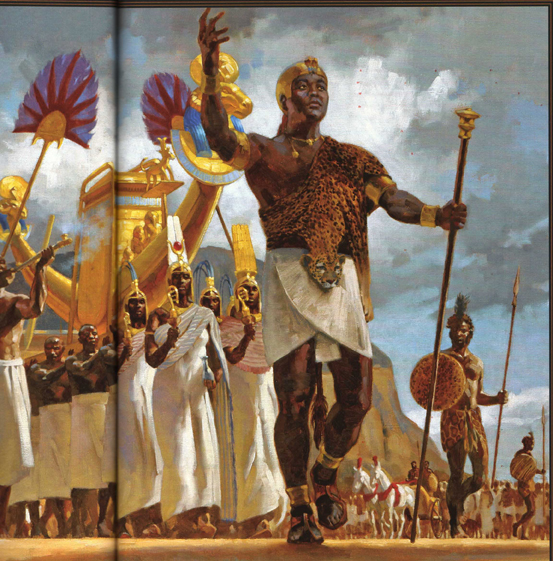In a monarchy, sovereignty is actually or nominally embodied in a single individual. When the monarch has no legal or moral restraints in religious, state and political matters, it is called an absolute monarchy and the monarch finds excessive liberties at using power absolutely.
Roman emperors and their absolute power are a notorious example. They became absolutely corrupted, and when that was not enough, they even declared themselves gods.
The idea of kings as gods was not innate to Roman culture; it was borrowed from the religious structure of king making in Ancient Egypt, as still is the practice in many parts of Africa.
Nonetheless, the Romans are widely known to have implemented this to devastating effect.
But the African religious foundation of auditioning rulers into gods have over centuries been grossly misunderstood and misinterpreted in the West. Perhaps in a notorious attempt to harness its captivating aura, Europeans have been the poster-child culprits in miss-applying it for material gain.
Napoleon Bonaparte, who declared himself an emperor, alluded to this European misrepresentation in order to be bestowed absolute power, which he used limitlessly.
The term, “Absolute power corrupts absolutely,” in Europe arose as part of a quotation by the elaborately titled John Emerich Edward Dalberg Acton, first Baron Acton (1834 -1902). The historian, who was otherwise known simply as Lord Acton, expressed this opinion in a letter to Bishop Mandell Creighton in 1887:
Power tends to corrupt, and absolute power corrupts absolutely. Great men are almost always bad men.
The text is a favourite of collectors of quotations and is always included in anthologies. If you are looking for the exact, “Power tends to corrupt, and absolute power corrupts absolutely” wording, then Acton is regarded in Europe as the ‘originator’.
He did not invent the idea or the term; several authors and orators had uttered quotations like it well before 1887.
A West African lawgiver from Nokyie (in present day Benin) with no shortage of names – Okomfo Anokye – who became Ashanti’s most revered high priest and statesman, gave a similar speech to the Ashanti House of Chiefs in 1723:
The Golden Stool is Ashanti and our king sits on it. The Golden Stool is ours. Its Power is absolute, but beware, this unlimited power will corrupt the mind of anyone who possess it alone.
The French republican poet and politician, who is also generously titled, Alphonse Marie Louis de Prat de Lamartine did mention the term in an English translation of his essay, ‘France and England: A Vision of the Future,’ which was published in London in 1848 and included the text:
It is not only the slave or serf who is ameliorated in becoming free… the master himself did not gain less in every point of view, for absolute power corrupts the best natures.
Whether it is Okomfo Anokye, Lamartine or his anonymous English translators, or Lord Acton, there is no more an authoritative source than the deliberations of Imhotep.
The Ancient Egyptian polymath, Imhotep, was so elaborate in his prescription on limiting the Pharaoh’s powers through religious and political institutions.
He writes:
The Pharaoh is a god, he is ordained by Amun [God], who speaks to our Pharaoh through our High Priest… God made Us. We are Him. The Pharaoh is part of Us, therefore his power is absolute when God speaks, because God is Absolute.
The Pharaoh carries the burden of Power for Us. Amun has given him this task, so we must help him, or this power spoils him eternally, and he ceases to be our Pharaoh – he’s destroyed, and refused into the Light by The Ancestors.
The Pharaoh knows this and We know it. Power is our burden to share – to make light our transition to meet The Ancestors. For the Power that is not shared, corrupts any Being absolutely, and forever. This we know from the teachings of The Ancestors.
Imhotep’s advice may have stood the test of time, haven been the cornerstone of Africa’s Communal System (Ubuntu) for thousands of years. It has directed our relations with other Human Beings, including Europeans, in economics and of governance.
Only, the Europeans have not reciprocated it in kind.
Alas, this fine balance of Maat, which Imhotep preached is at risk. In the West, it seems that Power has absolutely corrupted, and in Africa, Maat is constantly being challenged by the socio-political and the socio-economic policies that the West is constantly tooting around the continent through the World Bank and the IMF.
At this instance, will our fellow Europeans seek the Light? Only time will tell if The Ancestors will even permit us, as Africans, to see the Light, when we depart this world, seeing how much we have allowed our continent, our land, our traditions, our law, to be rampaged by foreigners.
Perhaps it is time to stop negotiating with people who believe that what they have is theirs, but what we have is negotiable (JFK).
The Power is Ours, we either Take it and Share it, or we forever Die.










